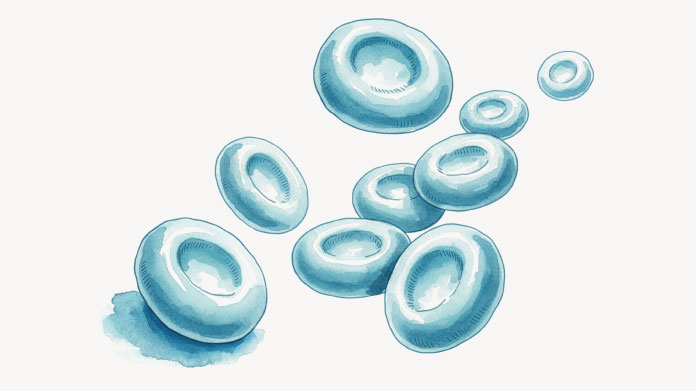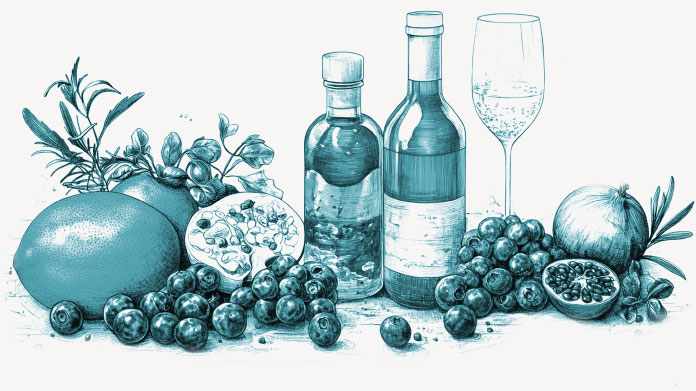What are the various causes of ageing?
Ageing is the result of a combination of genetic and environmental factors: DNA shortening, oxidative stress, glycation... Here we take a look at the ageing process, its causes, and the ways in which we can slow it down.

Shortening of telomeres
Ageing is a natural process – the body is genetically programmed to age. There is a finite number of times that our cells can divide and replicate. Each time they do so, the telomeres of our chromosomes get shorter – these are the protective tips at the end of each strand of DNA.
There is a limit to a cell’s ability to cope with this shortening, beyond which cellular DNA ceases to replicate, and along with it, the cell. Once this critical length is reached, the process of cell death is triggered. The cell undergoes a morphological change, mobilising the immune system, which ensures the cell is eliminated. Cell death leads more broadly to tissue death, and the body suffers progressive damage. This is part of the body’s natural cycle, but there are other mechanisms which account for premature ageing.
Oxidative stress and free radical attack
Oxidative stress is often highlighted as a damaging process for the body, but what is the mechanism behind it?
The process of oxidation which takes place in cells results in the formation of unstable molecules that contain unpaired electrons. These molecules, called free radicals, try to restore their stability by stealing an electron from another molecule. This triggers a rapid chain reaction, which the body is not always equipped to deal with.
The body has a range of natural antioxidant compounds at its disposal which are able to neutralise these free radicals. They include glutathione, enzymes (peroxidase, catalase, superoxide dismutase...), and vitamins C and E... But when these antioxidant reserves are inadequate, free radical attacks turn into oxidative stress. Along with the accompanying chain reaction, oxidative stress leads to the denaturation of proteins, lipids, and indeed all the molecules that form the body and make it function. Organs, skin, the nervous and cardiovascular systems, the whole body is affected by oxidative stress, and the result is premature ageing.
Note
While oxidation occurs naturally in the body, a number of external factors are known to exacerbate oxidative stress. They include smoking, alcohol, a diet low in fruit and vegetables, pollution, UV rays, and stress...
Harmful glycation products
The process of glycation is of increasing interest to researchers investigating ageing. It is a mechanism whereby sugars bind to proteins, creating glycated proteins.
It occurs at a greater rate when the body is overloaded with sugar, which is why it is seen more in diabetics. Glycated proteins ultimately produce what are called advanced glycation end-products or AGE: these play a role in premature ageing. They cause structural changes, particularly in cutaneous tissues, resulting in a slackening of the skin.
They also damage blood vessel walls, muscle cells and white blood cells... In short, the whole body is affected by excessive glycation. What’s more, AGE are not broken down by the body. Eliminating them is left to the kidneys but they cannot cope with excessive glycation and this leads to the accumulation of harmful residues. It’s another cascade of reactions that promotes premature ageing.
Ways of slowing down the ageing process
We’re all familiar with the consequences of ageing. They can be visible: deep lines and wrinkles, a bent spine, grey hair... and they can also be less obvious but pathological: cancer, neurodegenerative disorders and cardiovascular disease...
In order to slow down the ageing process, it naturally makes sense to adopt a sensible lifestyle. Eating a balanced diet high in antioxidants, taking regular exercise, and ensuring you get good quality sleep will all help to reduce oxidative stress and excessive glycation. It is also highly advisable to reduce alcohol consumption and refrain from smoking.
You can go further by taking compounds called senolytics. These molecules are currently being studied by scientists keen to learn more about their ability to slow down cellular ageing. Some of these natural compounds are already well-known:
- quercetin, a flavonoid found in capers, red onions and elderberries...;
- fisetin, another flavonoid naturally present in strawberries and mangoes, among others.
Senolytic-based, anti-ageing supplements (such as Senolytic Complex and Fisetin) can also provide valuable support in fighting premature ageing naturally.
References
- Herranz, N. & Gil, J. Mechanisms and functions of cellular senescence. J. Clin. Invest. 128, 1238–1246 (2018).
- Finkel, T., Holbrook, N. Oxidants, oxidative stress and the biology of ageing. Nature 408, 239–247 (2000).
- Semba RD, Nicklett EJ, Ferrucci L. Does accumulation of advanced glycation end products contribute to the aging phenotype? J Gerontol A Biol Sci Med Sci. 2010 Sep;65(9):963-75.
- Kirkland, J.L., Tchkonia, T., Zhu, Y., Niedernhofer, L.J. and Robbins, P.D. (2017), The Clinical Potential of Senolytic Drugs. J Am Geriatr Soc, 65: 2297-2301.
Keywords
2 Days
very good expereince
very good expereince
Jelena Đaković
2 Days
Very good products.
Very good products.
Agnes BENDSAK
4 Days
Just OK
Just OK, ordering from company for many years and being safisfied
Lynn Mae
5 Days
Recomendo
Produtos encomendados são recebidos atempadamente e de acordo com o anunciado! Muito satisfeita!
Carla Sofia
5 Days
Everything is great!
Everything is great!
Jonas
10 Days
The delivery was fast and the product…
The delivery was fast and the product is great
SOMMARIVA Gianni
11 Days
Great service and lots of information
Great service and lots of information
Gabi
14 Days
Service Satisfaction
I’m satisfied with the service; it fulfilled what it set out to do.
Anfhony Abreu
17 Days
Original product and fast delivery
Original product and fast delivery. I haven't started it yet, but will do soon.
Vincenza Catania
20 Days
Good quality
Good quality. Good service.
Leonel Guzman
22 Days
Top!!!!!!!!
Top!!!!!!!!
Michael
24 Days
Excellent!
Products are great and delivered fast!
PARDINI Debora
25 Days
From order to receive the product
From order to receive the product, the process is smooth & fast. It’s good to customers.
WONG Mei Ling
26 Days
Fast delivery
very quick delivery to italy. product is good.
Customer
27 Days
Prompt delivry !!👍
Prompt delivry !!👍
SWEET Christine
of experience
your money back
##montant## purchase




